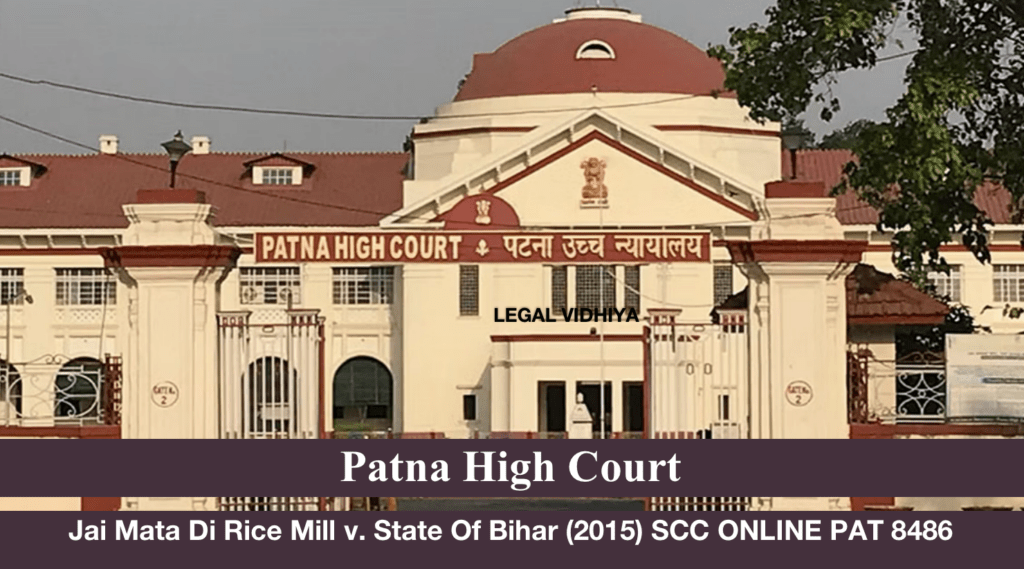
Jai Mata Di Rice Mill v. State Of Bihar (2015) SCC ONLINE PAT 8486
| Citation | (2015) SCC ONLINE PAT 8486 |
| Date of Judgement | 5TH October 2015 |
| Court | The Patna High Court |
| Appellant | Jai Mata Di Rice Mill & Ors |
| Respondent | State Of Bihar & Ors |
| Justice | Ashwani Kumar Singh |
| Reference | Section:406, 409, 415, 420 |
Facts:
The petitioners in this case are proprietors of firms involved in the custom milling of paddy. Grave allegations have been levied against the petitioners, alleging their involvement in the misappropriation of paddy and the issuance of fraudulent cheques with the intent to defraud the Corporation. These actions, if proven, potentialy violate the provisions of the Sections 406, 409, 415, and 420 of Indian Penal Code, 1860.
Under Section 406 and 409 of the IPC, criminal breach of trust by a public servant, or by a banker, merchant, or agent, is a punishable offense. If the petitioners are found guilty, they may face the consequences prescribed under this section. Additionally, the allegations of Issuing false cheques with the intent to gain undue advantage may attract the provisions of Section 415, which defines the offense of cheating. Moreover, if the allegations of fraud and misappropriation of paddy are proven, Section 420, dealing with cheating and dishonestly inducing delivery of property, may be invoked, as it addresses cases where individuals deceitfully induce others to deliver property, causing wrongful gain or loss to the affected party.
The First Information Reports (FIRs) filed against the petitioners have been instituted with the apparent objective of exerting pressure on them to fulfill their purported liabilities towards the Corporation. It is essential to note that the filing of FIRs represents the initiation of a criminal investigation and seeks to ensure a fair and impartial inquiry into the allegations made.
Issues:
The issue is whether the FIRs should be quashed, and whether the dispute is of a civil or criminal nature.
Arguments:
The petitioners vehemently contend that the initiation of the First Information Reports (FIRs) against them amounts to an abuse of the legal process. They assert that the underlying dispute is primarily civil in nature and, therefore, does not warrant criminal proceedings. Furthermore, they strongly argue that subjecting them to multiple proceedings of diverse nature for the same set of facts would constitute a gross abuse of the process of law.
Additionally, they emphasize the protection against double jeopardy, a fundamental tenet of criminal law that shields individuals from being prosecuted multiple times for the same offense. The petitioners contend that invoking both civil and criminal proceedings simultaneously for identical acts would contravene these fundamental legal doctrines.
They argue that the FIRs, filed without substantial grounds and motivated by ulterior motives, are an abuse of the legal machinery and seek to unduly burden and harass them.
Judgement:
Upon a thorough analysis of the facts and contentions presented, the Supreme Court finds that the plea for quashing the FIRs lacks merit. It is well-established that the power to quash an FIR or a complaint, exercised under the inherent jurisdiction of the High Court, should be restricted to very exceptional circumstances. The said power must not be utilized to stifle or hinder a legitimate prosecution.
Considering the magnitude of the alleged multi-crore paddy scam and the resultant loss caused to the exchequer, the Supreme Court have emphasized the necessity of conducting a comprehensive Investigation with utmost fairness and without unwarranted delay.
In light of the above, this Court is of the firm opinion that the FIRs in question cannot and should not be quashed. The allegations made against the petitioners are serious In nature and require a meticulous investigation. The present circumstances do not present a situation that warrants the extraordinary remedy of quashing the FIRs, as sought by the petitioners.
Consequently, this Court dismisses the present writ petitions and directs the concerned investigative agency to conduct a thorough inquiry into the alleged offenses in a fair, expeditious, and impartial manner. The investigation should be conducted strictly in accordance with the law, ensuring that the principles of natural justice are duly observed.
It is clarified that the observations made in this judgment are limited to the question of quashing the FIRs and do not prejudge the ultimate outcome of the investigation or the guilt or innocence of the petitioners.
In my opinion, the court’s decision in this case can be considered correct as it upholds legal principles, preserves the prosecutorial process, considers public interest, respects the separation of powers, and promotes impartiality and fairness in the investigation.
For the reasons elucidated above, we concur with the pronouncement of the esteemed court in the case under consideration. This appeal lacks merit and is hereby dismissed in accordance with the decision of the court.
Reference
Article by:
Bhagwat Mahajan
Himachal Pradesh National Law University, Shimla


![SEPCO Electric Power Construction Corporation Vs. Power Mech Projects Ltd. [August2021]](https://legalvidhiya.com/wp-content/uploads/2025/01/image-63-360x240.png)
![Union of India Vs. Association of Unified Telecom Service Providers of India [July 23, 2021]](https://legalvidhiya.com/wp-content/uploads/2025/01/image-62-360x240.png)
0 Comments